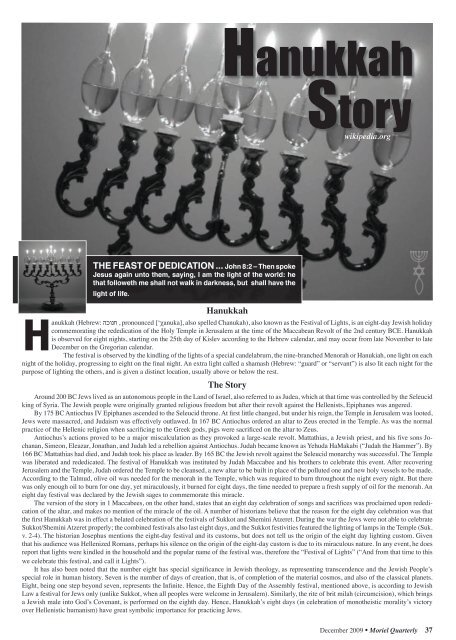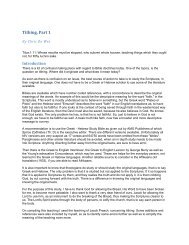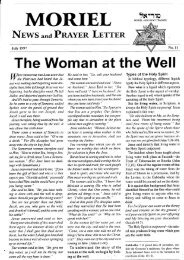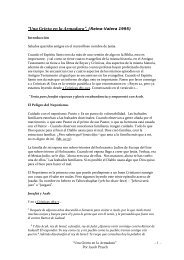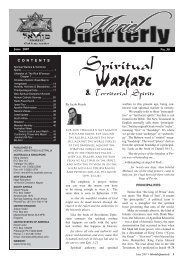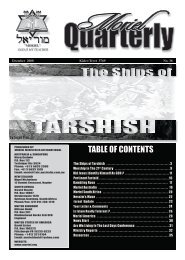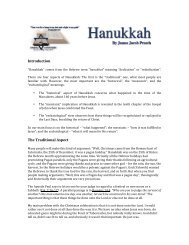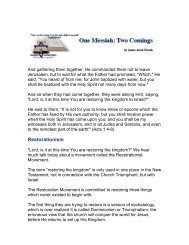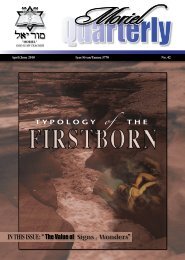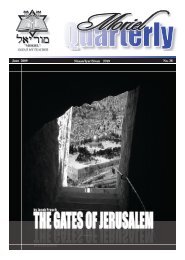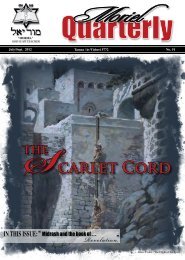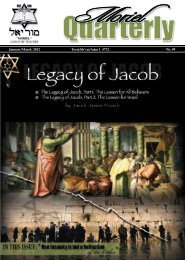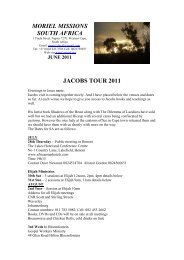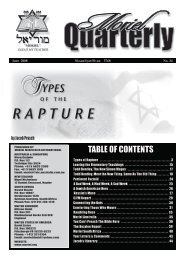The Wedding Feast (~19.49) - Moriel Ministries
The Wedding Feast (~19.49) - Moriel Ministries
The Wedding Feast (~19.49) - Moriel Ministries
Create successful ePaper yourself
Turn your PDF publications into a flip-book with our unique Google optimized e-Paper software.
Hanukkah<br />
Story<br />
wikipedia.org<br />
<strong>The</strong> <strong>Feast</strong> of dedication ... John 8:2 – <strong>The</strong>n spoke<br />
Jesus again unto them, saying, I am the light of the world: he<br />
that followeth me shall not walk in darkness, but shall have the<br />
light of life.<br />
Hanukkah<br />
Hanukkah (Hebrew: hkwnj , pronounced [‘χanuka], also spelled Chanukah), also known as the Festival of Lights, is an eight-day Jewish holiday<br />
commemorating the rededication of the Holy Temple in Jerusalem at the time of the Maccabean Revolt of the 2nd century BCE. Hanukkah<br />
is observed for eight nights, starting on the 25th day of Kislev according to the Hebrew calendar, and may occur from late November to late<br />
December on the Gregorian calendar.<br />
<strong>The</strong> festival is observed by the kindling of the lights of a special candelabrum, the nine-branched Menorah or Hanukiah, one light on each<br />
night of the holiday, progressing to eight on the final night. An extra light called a shamash (Hebrew: “guard” or “servant”) is also lit each night for the<br />
purpose of lighting the others, and is given a distinct location, usually above or below the rest.<br />
<strong>The</strong> Story<br />
Around 200 BC Jews lived as an autonomous people in the Land of Israel, also referred to as Judea, which at that time was controlled by the Seleucid<br />
king of Syria. <strong>The</strong> Jewish people were originally granted religious freedom but after their revolt against the Hellenists, Epiphanes was angered.<br />
By 175 BC Antiochus IV Epiphanes ascended to the Seleucid throne. At first little changed, but under his reign, the Temple in Jerusalem was looted,<br />
Jews were massacred, and Judaism was effectively outlawed. In 167 BC Antiochus ordered an altar to Zeus erected in the Temple. As was the normal<br />
practice of the Hellenic religion when sacrificing to the Greek gods, pigs were sacrificed on the altar to Zeus.<br />
Antiochus’s actions proved to be a major miscalculation as they provoked a large-scale revolt. Mattathias, a Jewish priest, and his five sons Jochanan,<br />
Simeon, Eleazar, Jonathan, and Judah led a rebellion against Antiochus. Judah became known as Yehuda HaMakabi (“Judah the Hammer”). By<br />
166 BC Mattathias had died, and Judah took his place as leader. By 165 BC the Jewish revolt against the Seleucid monarchy was successful. <strong>The</strong> Temple<br />
was liberated and rededicated. <strong>The</strong> festival of Hanukkah was instituted by Judah Maccabee and his brothers to celebrate this event. After recovering<br />
Jerusalem and the Temple, Judah ordered the Temple to be cleansed, a new altar to be built in place of the polluted one and new holy vessels to be made.<br />
According to the Talmud, olive oil was needed for the menorah in the Temple, which was required to burn throughout the night every night. But there<br />
was only enough oil to burn for one day, yet miraculously, it burned for eight days, the time needed to prepare a fresh supply of oil for the menorah. An<br />
eight day festival was declared by the Jewish sages to commemorate this miracle.<br />
<strong>The</strong> version of the story in 1 Maccabees, on the other hand, states that an eight day celebration of songs and sacrifices was proclaimed upon rededication<br />
of the altar, and makes no mention of the miracle of the oil. A number of historians believe that the reason for the eight day celebration was that<br />
the first Hanukkah was in effect a belated celebration of the festivals of Sukkot and Shemini Atzeret. During the war the Jews were not able to celebrate<br />
Sukkot/Shemini Atzeret properly; the combined festivals also last eight days, and the Sukkot festivities featured the lighting of lamps in the Temple (Suk.<br />
v. 2-4). <strong>The</strong> historian Josephus mentions the eight-day festival and its customs, but does not tell us the origin of the eight day lighting custom. Given<br />
that his audience was Hellenized Romans, perhaps his silence on the origin of the eight-day custom is due to its miraculous nature. In any event, he does<br />
report that lights were kindled in the household and the popular name of the festival was, therefore the “Festival of Lights” (“And from that time to this<br />
we celebrate this festival, and call it Lights”).<br />
It has also been noted that the number eight has special significance in Jewish theology, as representing transcendence and the Jewish People’s<br />
special role in human history. Seven is the number of days of creation, that is, of completion of the material cosmos, and also of the classical planets.<br />
Eight, being one step beyond seven, represents the Infinite. Hence, the Eighth Day of the Assembly festival, mentioned above, is according to Jewish<br />
Law a festival for Jews only (unlike Sukkot, when all peoples were welcome in Jerusalem). Similarly, the rite of brit milah (circumcision), which brings<br />
a Jewish male into God’s Covenant, is performed on the eighth day. Hence, Hanukkah’s eight days (in celebration of monotheistic morality’s victory<br />
over Hellenistic humanism) have great symbolic importance for practicing Jews.<br />
December 2009 • <strong>Moriel</strong> Quarterly 37


